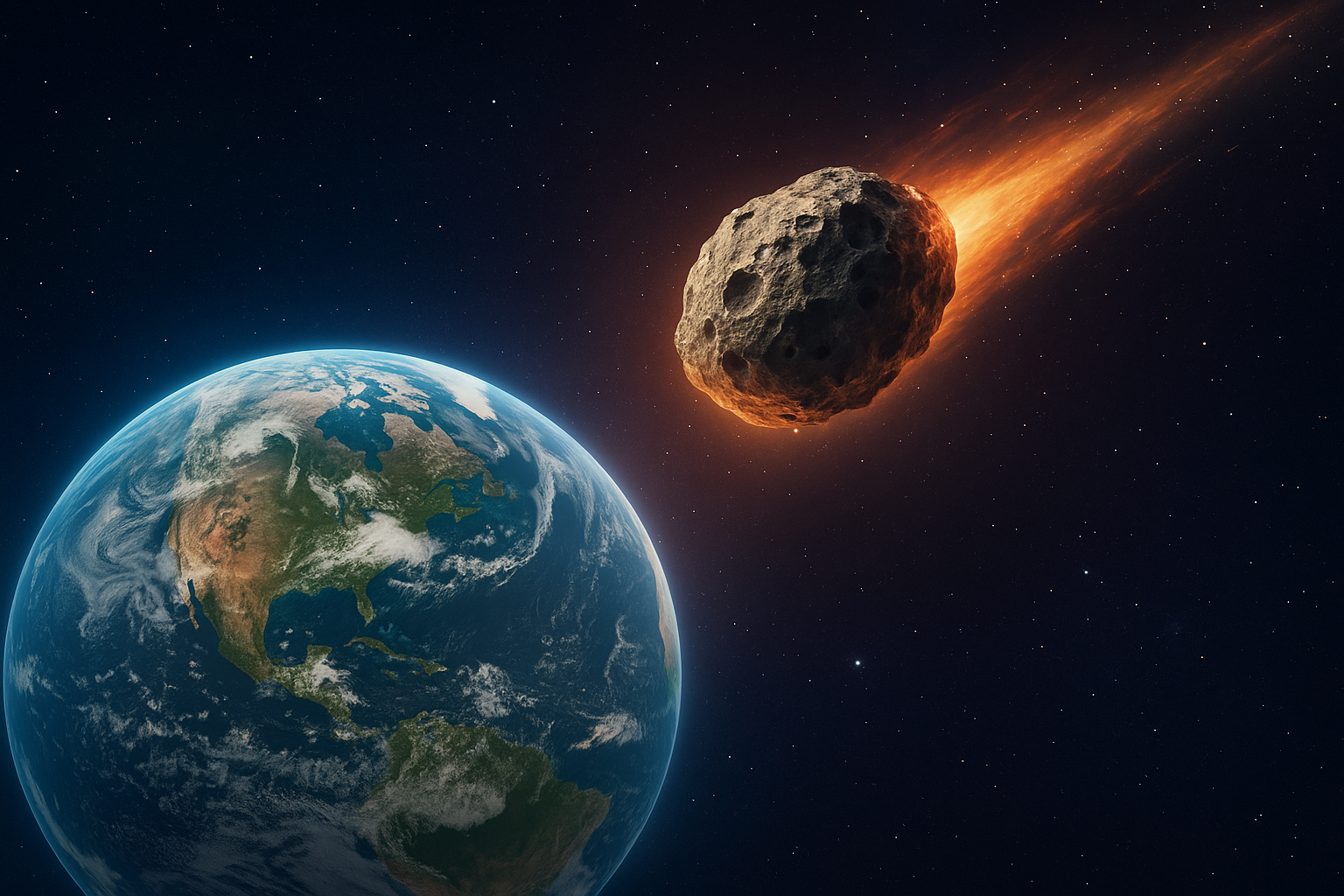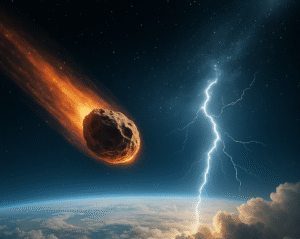
🌩️ The Shock You Didn’t See Coming
Asteroid impact probability is not just a number buried in science papers — NASA’s latest study shows it’s higher than most people imagine, even compared to everyday risks like lightning strikes.
If I told you that during your lifetime, Earth has a better chance of getting smacked by a massive asteroid than you do of being struck by lightning… would you believe me?

Most people wouldn’t. Lightning feels immediate, real — you can see the storm clouds rolling in. Asteroids? They’re “out there,” floating in the void, not part of our day-to-day worries.
But according to a brand-new NASA study on asteroid impact probability, the odds tell a different story. And once you see them, you’ll understand why scientists are so determined to keep watch.
🚀 What Counts as a “Dangerous” Asteroid?
Let’s start with the basics. A Near-Earth Object (NEO) is basically any asteroid or comet that gets close enough to potentially cross paths with our planet.
Now, not all NEOs are a problem. Most are small — the size of a car or even a basketball — and burn up harmlessly in the atmosphere.
The ones we do worry about are 140 meters across or bigger. That’s longer than a football field, and more than enough to flatten an entire city if it hit land, or cause massive tsunamis if it splashed down in the ocean.
Interestingly, not all threatening space visitors are asteroids. Some are comets — icy bodies from the far reaches of the Solar System or even other star systems. In fact, Hubble recently captured incredible images of Interstellar Comet 3I/ATLAS — a rare visitor from beyond our solar neighborhood.
📊 What the Study Says
This new research used 5 million simulated asteroid orbits to figure out how often these big space rocks might hit Earth.
Here’s the number that matters:
-
The chance of a >140m asteroid hitting Earth in any given year is about 1 in 11,000.
-
Over an average human lifetime (about 71 years), that’s roughly 1 in 155.
If 1 in 155 doesn’t sound small to you… that’s because it’s not. In fact, it’s comparable to the lifetime odds of dying in a house fire or drowning.
⚡ More Likely Than Lightning
To make sense of these numbers, the scientists compared asteroid impacts to other events that we actually think about:
| Event | Lifetime Chance |
|---|---|
| Large asteroid hitting Earth | 1 in 155 |
| Struck by lightning (USA) | 1 in 3,000 |
| Carbon monoxide poisoning (Denmark) | 1 in 4,500 |
| Fatal car accident (USA) | 1 in 93 |
| Influenza infection (Global) | Almost certain |
The big takeaway?
A giant asteroid hitting Earth in your lifetime is about 20 times more likely than you personally being struck by lightning
🌋 History Has Already Warned Us
We don’t have to dig into dinosaur history to find examples of dangerous impacts. A few reminders from the last century:
-
1908 — Tunguska, Russia: An asteroid exploded in the atmosphere, flattening 80 million trees across 2,000 square kilometers.
-
2013 — Chelyabinsk, Russia: A smaller rock, about 20 meters across, exploded over the city, injuring more than 1,000 people.
-
1994 — Jupiter: The comet Shoemaker–Levy 9 broke apart and slammed into the gas giant, leaving Earth-sized scars in its atmosphere.
The scary part? Tunguska and Chelyabinsk were from much smaller objects than the ones this study focused on.
🛡️ The Good News: We Can Stop It
Asteroids aren’t like hurricanes or earthquakes — we can actually prevent an impact.
In 2022, NASA’s DART Mission smashed a spacecraft into an asteroid’s moon and successfully changed its orbit. This was a world-first test of “planetary defense” technology.
If we spot a dangerous asteroid early enough — we’re talking years or decades — we can nudge it just enough so it misses Earth entirely.
🔭 Why Early Detection Is Everything
The catch?
We can’t stop what we don’t see coming.
That’s why astronomers scan the sky every single night. Future projects like the NEO Surveyor space telescope and the Vera Rubin Observatory will supercharge our ability to spot threats years in advance.
Think of them as Earth’s early warning system.
🏠 An Insurance Policy for the Planet
You don’t buy fire insurance because you expect your house to burn down — you buy it because the cost of not having it is too high.
Planetary defense is the same idea. We hope we’ll never need to deflect an asteroid, but the price of being ready is tiny compared to the cost of being caught off guard.
🤔 Why This Should Matter to You
Even if you’re nowhere near the predicted impact zone, a large asteroid strike could still affect you:
-
Global food shortages from climate disruption
-
Economic collapse from trade interruptions
-
Mass migration from devastated regions
This isn’t just about “somewhere else in the world.” An asteroid impact is the kind of event that reshapes everything.
Leave a Reply